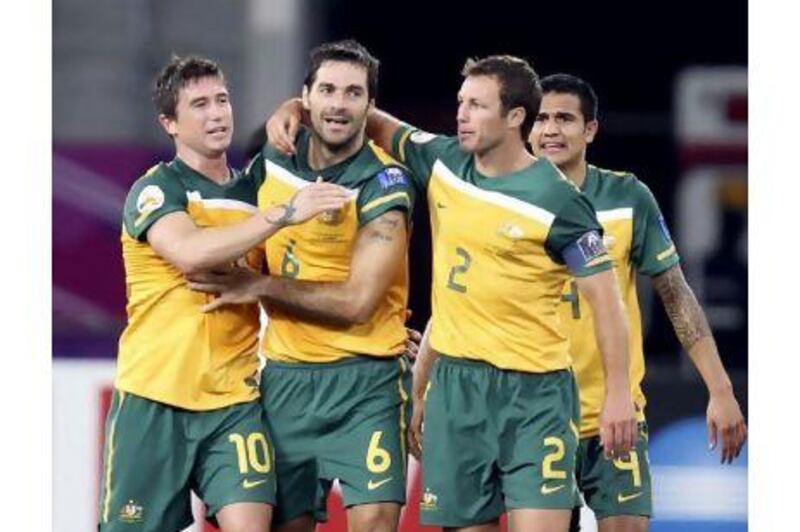DOHA // Before Tim Cahill, Harry Kewell, Mark Schwarzer, Brett Emerton and Lucas Neill, Australia as a footballing nation was a global afterthought.
One World Cup finals appearance, in 1976, when they failed to score in three matches, and three Oceania Confederation titles, which neither the Australians nor anyone else considered significant.
Then came the Down Under "golden generation", which produced the aforementioned players, the key performers for a suddenly formidable Australia. They reached the knockout stage of the 2006 World Cup, qualified easily from Asia for the 2010 World Cup and made the final eight of the 2007 Asian Cup.
Tonight, Australia's grand old men, by football standards, have a chance to win the most significant trophy in their country's history when they meet Japan for the Asian Cup championship at the Khalifa Stadium.
"There's been a group of people together for a long time who lifted the level of football in Australia," Lucas Neill, the Socceroos captain, said yesterday. "Winning the Asian Cup would be a nice reward, something to put next to your name and on your CV. Doesn't mean we'll get it; Japan stands in our way. But we have a chance to win a major championship and there aren't many of those out there."
Neill's words came after a blunt question from a reporter about "your first chance to win a major trophy and probably your last", and his measured response would seem to indicate that he and the other Australian veterans acknowledge that they cannot keep this up forever.
Schwarzer, the Fulham goalkeeper, is 38. Neill, a defender who played for Blackburn Rovers, West Ham United and Everton, is 32, as is Harry Kewell, a forward familiar to fans of Leeds United and Liverpool. Cahill, an Everton stalwart, is 31, as is Emerton, a Blackburn midfielder.
Add in Sasa Ognenovski, the defender, new to the Australian national team but already 31, and the midfielder Jason Culina, 30, who already has been pushed out of the first XI, and tonight's match has strong overtones of "their last, best chance" for the elders. The next World Cup is more than three years off, and the 2015 Asian Cup is four.
Japan, one victory away from a record fourth Asian Cup, represent a formidable hurdle. They have shown remarkable tenacity throughout this tournament, erasing deficits in three of their five matches and avoiding a draw in the 81st minute of another.
In the semi-final, they let slip a lead to South Korea in the last minute of extra time, then coolly won the shoot-out 3-0.
"Our team spirit and togetherness have been fantastic," said Alberto Zaccheroni, Japan's Italian coach. "I like the way we have gotten to the final; we have had some very difficult matches."
The final is a compelling collision of contrasting styles. The Australians are big, bluntly physical and dangerous in the air on set pieces.
Japan appear to be both quicker and faster, as well as more comfortable on the ball. They also have a remarkable work rate. Australia play with Kewell or Cahill often alone up front; Japan's preferred formation is a 4-3-3.
Australia have conceded only one goal in five matches, but Japan have scored 13. Conversely, the Aussies scored only three goals in three matches before thrashing Uzkbekistan 6-0 in the semi-finals, but Japan have only one clean sheet in the tournament.
Japan will play without Shinji Kagawa, the 21-year-old Borussia Dortmund forward, out with a broken foot; his likely replacement is Hajime Hosagai. The Japanese have other threats in the attack: Ryoichi Maeda and Shinji Okazaki each have three goals in this tournament.
The Japanese concede that Australia's coach, the German Holger Osieck, brings a familiarity with Japanese football to the match; he coached the Japan club Urawa Red Diamonds to the 2007 Asian Champions League title. Two of his players were Hosagai and Japan's captain, the midfielder Makoto Hasebe.
Zaccheroni said he was not concerned by his opposite number's experience in Japan. "This is a different team," the Italian said, "and we have made a study of Australia and know them well."
Neill acknowledges that "we're very determined to win this game" but said Australia will not sink into obscurity when he and his contemporaries are gone.
"No worries," he said. "There's a conveyor belt of talent coming along but you're not seeing them because we won't give up our spots.
"When it's time to move on, I'm sure we have plenty of players to take our place. But don't write us off yet."
7pm, today, Abu Dhabi Sports 3, Aljazeera Sports 1, 1HD, +4 & +10





